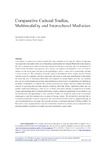Comparative Cultural Studies. Multimodality and Intercultural Mediation

View/
Use this link to cite
http://hdl.handle.net/2183/13303Collections
Metadata
Show full item recordTitle
Comparative Cultural Studies. Multimodality and Intercultural MediationAuthor(s)
Date
2012Citation
Culture of communication / Communication of culture, 2012: 2111-2120. ISBN: 978-84-9749-522-6
Abstract
[Abstract] In this paper we present our current research that draws attention to the material vehicles of language, focusing on the multimodal forms that are becoming common place in Computer Mediated Communication. We take as starting point socio-constructivist approaches that have maintained that the development of higher mental functions is sociogenetic, thus arguing that cognitive development is first the result of exposure to the social plane and then to the psychological plane, a move that is semiotically mediated in social interaction. This conception of human cognitive development offers insights into the relations between mind development, education processes and socio-cultural and technological implications. We claim that acts of production, distribution and reception of cultural objects form the very symbolic structure of cultural phenomena, and that these performances are located in the materiality of informational exchanges. Furthermore, we indicate that discursive practices and images form the complex multimodal network of signifying practices that constructs realities, rather than simply representing them, and that socially constructed meaning or what we call “culture” takes place through the negotiation of stories, images, and meanings, that is, through performative, jointly-constructed agreements, power relations, and the authorisation and legitimating of social positions. Finally, we situate the study of art is a powerful metacognitive tool that portrays the evolution of human culture. We defend the important role of humanities in processes of social construction and contend that this role is further enhanced through the use of multimodal forms of support. The example of a piece of electronic literature (“30 Days of Rain” by Travis Alber serves a practical show-case that presents the need for a new framework on multimodal social semiotics capable of explain multimodal encounters mediated by digital media.
ISBN
978-84-9749-522-6





